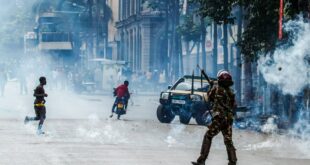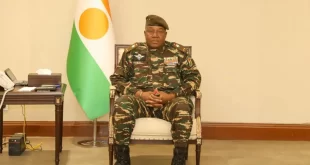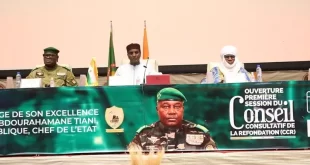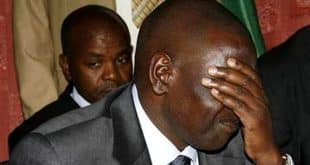 He is the peace man of Kenya. Many observers thought he would win the last Nobel Prize of literature. He failed against the Canadian Alice Munro, 82 years old, but it will eventually happen…
He is the peace man of Kenya. Many observers thought he would win the last Nobel Prize of literature. He failed against the Canadian Alice Munro, 82 years old, but it will eventually happen…
At 75 years old, Ngugi wa Thiong’o became the ambassador of African culture all over the world.
He published around thirty novels, wrote numerous plays, collections of short stories, essays and books for children. From his youngest age, he stood out as a committed, Marxist and anti-imperialist writer. He was born James Ngugi in 1938 in Kamiriithu (near Nairobi). He is the fifth son of the third of four women of his father Thiong’o wa Nducu. He studied at Presbyterian mission school of Scotland Church before entering, in 1949, the independent, religious and nationalist school, Karing’a. Brilliant, he obtained a scholarship for Alliance School, the only Kenyan secondary school to train Africans. Ngugi wa Thiong’o left for studies in Uganda at the university Makerere in 1962, which is then the only university of east Africa (dependent on university of London). He managed the Penpoint magazine and got known thanks to his first play The Black Hermit.
In 1962, he wrote his first novel, Weep not Child.
On his return to Kenya, Ngugi wa Thiong’o became a journalist for the prestigious weekly magazine, The Nation. But he did not finish with his studies! He left for England at the University of Leeds where he will start a research work on Joseph Conrad. The writer then published A Grain of Wheat, which will be worth to him his first international success.
From 1967, he successively taught in Kenya and in Uganda. He was a vocal advocate of literature in African languages. In 1986, he wrote Decolonising the Mind in which he spoke about his « goodbye to English language ». « As far as they are the ones of the people, African languages can only be enemies of neocolonial State ».
His commitment led him to behind bars in 1978 under Jomo Kenyatta for the theme of his play Kikuyu, Ngaahika Ndeenda (« I Will Marry When I Want »).
It needed more to break him in his run up. In the cell 16 of the high-security prison of Kamiti, he wrote on toilet paper his first novel in Kikuyu: Caitaani Mutharabaini (« Devil on the cross »), which will be published in 1980 at Heinemann editions.
In 1982, the regime of Daniel Arap Moi wanted to put him back under locks. He exiled himself in England and in the United States, where he taught at Universities of Yale then of New York before becoming a director of the international Center for writing and translation of the University of California. In 1986, he escaped from an assassination attempt stirred up by the regime of Arap Moi.
But he was not at the end of his tests: he returned to Kenya on July 31st, 2004 after 22 years of absence. A few days after his return, the writer and his wife were woken up in the middle of the night in their rental apartment in Norfolk Towers. Four aggressors, armed with revolvers, a machete and a pair of shears, raped the woman of the writer in front of him. Ngugi wa Thiong’o was beaten and his face burned. The criminals will be arrested a few days later and condemned.
He secretly dreamed of receiving the Nobel Prize of literature. He would have been the sixth African after the Nigerian Wole Soyinka (1986), the Egyptian Naguib Mahfouz (1988), the South Africans Nadine Gordimer (1991) and J.M. Coetzee (2003) and French-Mauritian J.M.G. Clézio (2008).
His books:
The Black Hermit, 1963 (play)
Weep Not, Child, 1964, Heinemann 1987, McMillan 2005, (ISBN 1-4050-7331-4)
The River Between, Heinemann 1965, Heinemann 1989, (ISBN 0-435-90548-1)
A Grain of Wheat, 1967 (1992) (ISBN 0-14-118699-2)
This Time Tomorrow (play), c. 1970
Homecoming: Essays on African and Caribbean Literature, Culture, and Politics, Heinemann 1972, (ISBN 0-435-18580-2)
A Meeting in the Dark (1974)
Secret Lives, and Other Stories, 1976, Heinemann 1992 (ISBN 0-435-90975-4)
The Trial of Dedan Kimathi (play), 1976, (ISBN 0-435-90191-5), African Publishing Group, (ISBN 0-949932-45-0) (with Micere Githae Mugo and Njaka)
Ngaahika ndeenda: Ithaako ria ngerekano (I Will Marry When I Want), 1977 (play; with Ngugi wa Mirii), Heinemann Educational Books (1980)
Petals of Blood, (1977) Penguin 2002, (ISBN 0-14-118702-6)
Caitaani mutharaba-Ini (Devil on the cross), 1980
Writers in Politics: Essays, 1981 (ISBN 978-0-85255-541-5) (GB) (ISBN 978-0-435-08985-6) (US)
Education for a National Culture, 1981
Detained: A Writer’s Prison Diary, 1981
Devil on the Cross (English translation of Caitaani mutharaba-Ini), Heinemann, 1982, (ISBN 0-435-90200-8)
Barrel of a Pen: Resistance to Repression in Neo-Colonial Kenya, 1983
Decolonising the Mind: The Politics of Language in African Literature, 1986 (ISBN 978-0-85255-501-9) (GB)
Mother, Sing For Me, 1986
Writing against Neo-Colonialism, 1986
Njamba Nene and the Flying Bus (Njamba Nene na Mbaathi i Mathagu), 1986 (book for children)
Matigari ma Njiruungi, 1986
Njamba Nene and the Cruel Chief (Njamba Nene na Chibu King’ang’i), 1988 (book for children)
Matigari, Heinemann 1989, Africa World Press 1994, (ISBN 0-435-90546-5)
Njamba Nene’s Pistol (Bathitoora ya Njamba Nene), (book for children), 1990, Africa World Press, (ISBN 0-86543-081-0)
Moving the Centre: The Struggle for Cultural Freedom, Heinemann, 1993, (ISBN 978-0-435-08079-2) (US) (ISBN 978-0-85255-530-9) (UK)
Penpoints, Gunpoints and Dreams: The Performance of Literature and Power in Post-Colonial Africa, (The Clarendon Lectures in English Literature 1996), Oxford University Press, 1998. (ISBN 0-19-818390-9)
Mũrogi wa Kagogo (Wizard of the Crow), 2004, East African Educational Publishers, (ISBN 9966-25-162-6)
Wizard of the Crow, 2006, Secker, (ISBN 1-84655-034-3)
Something Torn and New: An African Renaissance, Basic Civitas Books, 2009, (ISBN 978-0-465-00946-6) 2
Dreams in a Time of War: a Childhood Memoir, Harvill Secker, 2010, (ISBN 978-1-84655-377-6)
Rewards
2001 : Premio Nonino
1999 : Fonlon-Nichols Prize
Bibliography
Simon Gikandi, Ngugi wa Thiong’o, volume 8 of Cambridge studies in African and Caribbean literature, Cambridge University Press, 2000.
Jacqueline Bardolph, Ngugi wa Thiong’o, Paris – Dakar, Présence africaine, 1991.
Oliver Lovesey, Ngũgĩ wa Thiong’o, New York, Twayne, 2000.
 Africa Top Success Ils font l'Afrique
Africa Top Success Ils font l'Afrique













